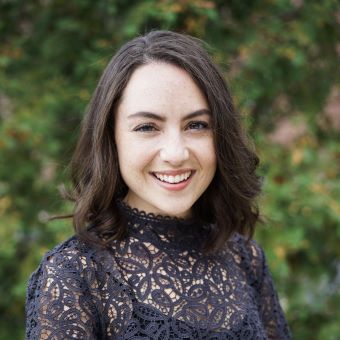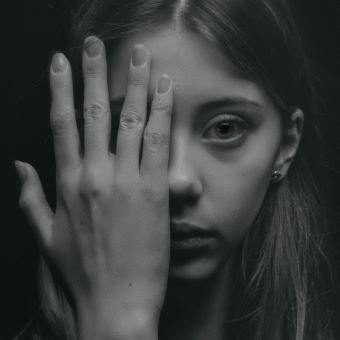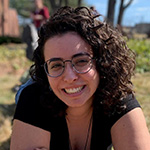Jewish Women Passing During the Holocaust
March 19, 2021
By Gavi Klein
Editor's Note: The HBI Research Award program awards grants annually to support research or artistic projects in Jewish women’s and gender studies across a range of disciplines. In 2021, HBI gave out 16 awards totaling $62,000. This is one in an occasional series on past research award recipients and their ongoing work.
 Most known stories about Jews hiding during the Holocaust focus on the physical act of hiding. Hana Green, 2019 Hadassah-Brandeis Institute Research Award recipient, finds the narratives of non-physical hiding an equally important and largely unaddressed issue.
Most known stories about Jews hiding during the Holocaust focus on the physical act of hiding. Hana Green, 2019 Hadassah-Brandeis Institute Research Award recipient, finds the narratives of non-physical hiding an equally important and largely unaddressed issue.
"In brief, my research centers on assessing the experience of Jewish women who passed as 'Aryan' by assuming false identities and hiding in plain sight," Green said. She is using her research award to understand more about what she has found to be a gaping hole in the historical studies of the Holocaust: specifically the "passing" of Jewish women. While her research has been stalled, temporarily, due to the closing of the United States Holocaust Memorial Museum in light of the pandemic, Green already has some extensive ideas on the topic, in part thanks to her work in the past two years at the Strassler Center for Holocaust and Genocide Studies at Clark University.
Initially, Green wasn't looking at the impact of Jewish women passing during the Holocaust, but more broadly at womens' experiences during the period overall. She says, "Early on in my research I worked with diaries and oral testimonies of Jewish women both in hiding and those passing 'in plain sight.' I was astounded by these experiences and as I began to look deeper, I realized that there was little specific research on passing more broadly." From there on, Green's research proceeded with a singular focus on Jewish women who passed as Aryan in Germany and Austria during the Holocaust.
 Part of what initially drew Green to this topic was the lack of research around what she saw as a poignantly significant issue. "I think that largely, passing narratives have been subsumed alongside those of hiding and resistance," she says. "They've been primarily incorporated within these other narratives because of how deeply entangled they are (passing was a form of hiding and was, I argue, an active act of resistance) and because of the fluid nature of passing." The distinctions between narratives of passing and narratives of hiding and resistance are key, Green notes, and she intends to use her research to draw conclusions on the impact of these distinctions later down the line.
Part of what initially drew Green to this topic was the lack of research around what she saw as a poignantly significant issue. "I think that largely, passing narratives have been subsumed alongside those of hiding and resistance," she says. "They've been primarily incorporated within these other narratives because of how deeply entangled they are (passing was a form of hiding and was, I argue, an active act of resistance) and because of the fluid nature of passing." The distinctions between narratives of passing and narratives of hiding and resistance are key, Green notes, and she intends to use her research to draw conclusions on the impact of these distinctions later down the line.
Until then, Green has explored other accounts of passing, and the revealing nuances within those accounts. For one, she has delved into the complexities that family dynamics played in narratives of passing. "I've come across both individuals who passed by themselves, as well as individuals who passed with either a partner, friend or other family member," she says, "Many of the individuals I've studied have commented on the often painful decision to leave family members behind in ghettos or when transport orders arrived." Often, only one or a few family members of a given family unit were able to access the proper documents to "legally pass," and as Green notes, were forced to face the heartbreaking decision of whether to leave their family behind.
Family is only part of it, however. Green's research mostly centers on women's experiences of passing and the role of gender in those experiences. "For a long time it was contended that women were more successful in both hiding and passing," she notes. She goes on to explain that the physical markers of Jewish men (circumcision) and the stereotypes of them, in addition to sexual politics, tended to make it easier for a woman to pass. She is still learning whether women were actually more successful at passing, or more likely to have attempted to, but even though her research centers on women, "studying the experiences of Jewish women who passed will also play a role in understanding this survival mechanism more broadly, and thus inform the study of male passers."
Green's studies have a far reach; while she delves primarily into the Holocaust, her findings have echoes even farther back in history, with noted parallels to Crypto-Jews and Conversos in the Spanish Inquisition. In more recent times, she draws connections to modern American Jewish history and American Jews concealing their Jewish identity to bypass occupational discrimination or academic quotas, such as changing their appearance to appear "less Jewish" or anglicizing their surnames. Green's work in a past project on the Inquisition notes several uniting qualities of passing both then and during the Holocaust: "passing as an act of resistance, the impact of appearance and aesthetic on one's ability to pass, the impact of racial conceptions in each instance of passing, the effect of one's relationship to Judaism and Jewish practice, the complexities of Jewish identity construction and malleability, and the centrality of antisemitism in the Jewish experience."
She goes on, "While, at their core, each of these examples of Jewish passing were unique, these key common threads appeared in each instance and entwined them together to form distinct lines of continuity and crossover which, I argue, contribute to the creation of a longer, shared practice of passing as a Jewish response to persecution." Many of these qualities also seem to also draw in modern-day American Jewish experiences as well, though in a notably different and less immediately threatening political and social environment.
Green's project highlights fascinating connections between the present and the past and how they intersect in ways that remain timeless. "This research may be helpful to the broader study of questions related to identity fluidities, ambiguities, and transformations," Green says. "Perhaps even more significant, this investigation may provide fruitful commentary on passing experiences more broadly
 Gavi Klein, Brandeis ‘21, American Studies, is an HBI student blogger.
Gavi Klein, Brandeis ‘21, American Studies, is an HBI student blogger.
Hana Green is a PhD student studying Holocaust history at Clark University's Strassler Center for Holocaust and Genocide Studies in Worcester, Massachusetts, where she holds a Claims Conference Fellowship. She received a research award from HBI for this work in 2019.